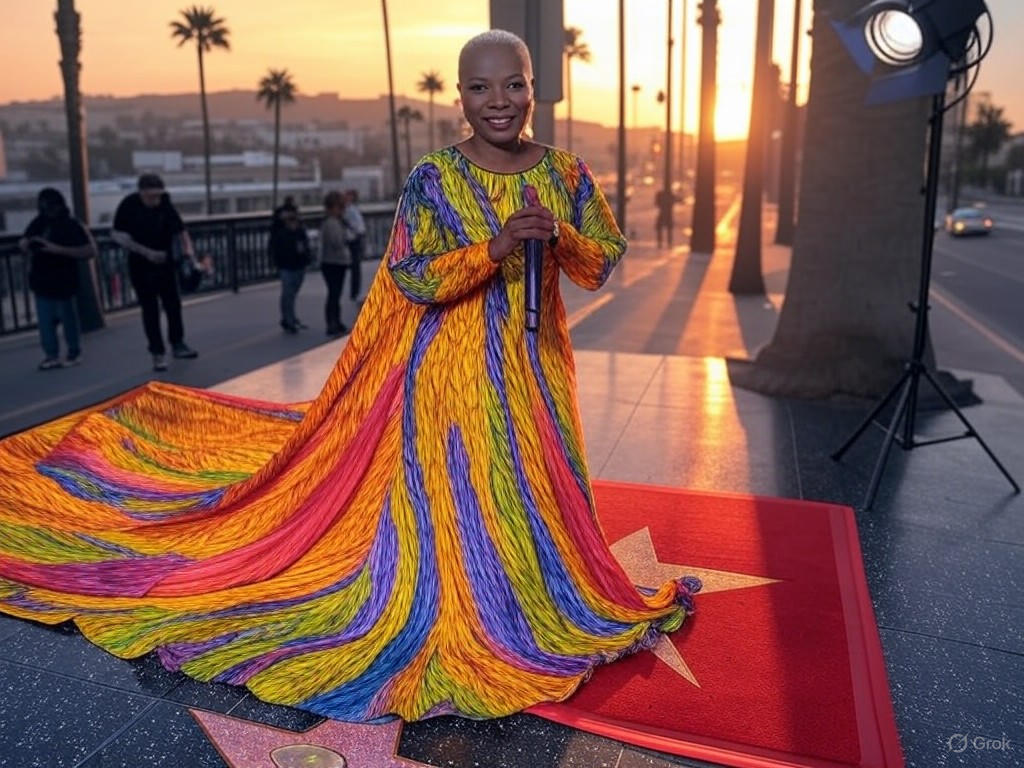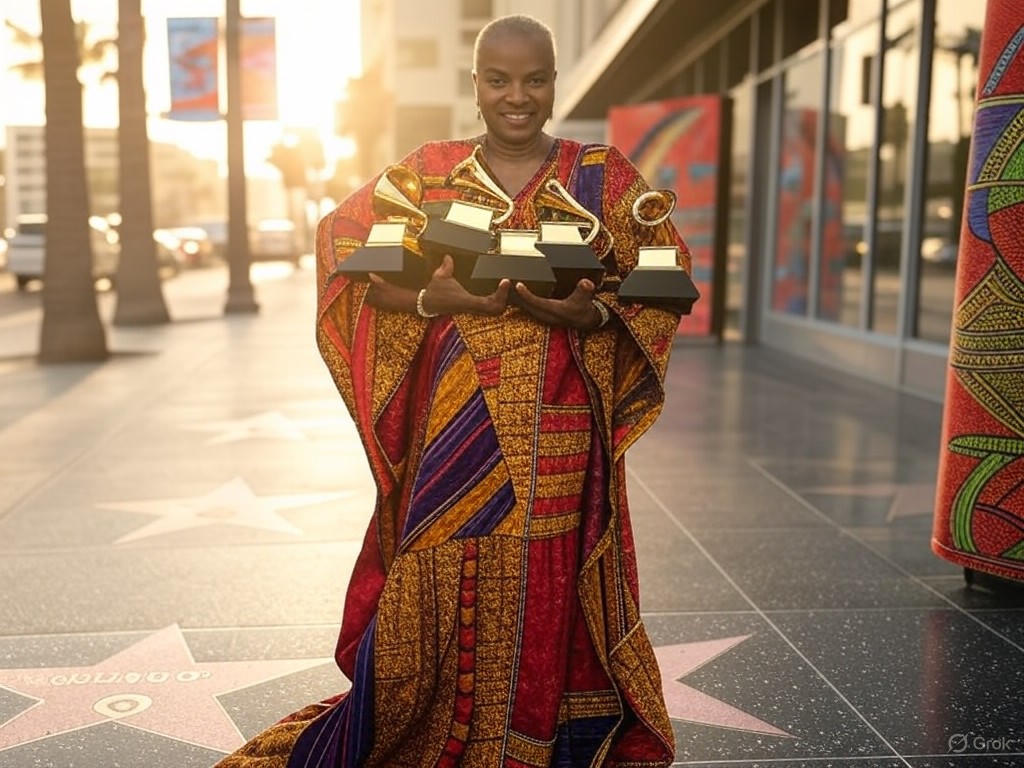Angélique Kidjo’s Global Impact: A Hollywood Honor
In the glittering heart of Hollywood, where dreams are etched into the pavement, the announcement of the 2026 Hollywood Walk of Fame honorees serves as a vivid reminder of the enduring power of talent and perseverance. Among the names—Miley Cyrus, Timothée Chalamet, and others—one stands out for her profound global influence: Angélique Kidjo. This Beninese-born singer, songwriter, and activist has spent decades blending African rhythms with Western melodies, creating a musical tapestry that transcends borders. Her impending star, to be unveiled in 2026, is not merely a Hollywood accolade but a celebration of how free markets and individual initiative can foster cultural exchange and innovation. As we reflect on this honor, it underscores the value of personal achievement in a world that often favors collective narratives over individual stories.
Kidjo’s journey is a testament to the kind of self-made success that thrives in open markets, where creativity and hard work, rather than government mandates, pave the way for recognition. Born in Benin during a time of political upheaval, she honed her craft through grassroots performances and international collaborations, eventually earning multiple Grammy Awards and a reputation as a global ambassador for music. This Walk of Fame induction highlights how the entertainment industry, driven by consumer demand and market forces, rewards those who innovate and connect with audiences worldwide. In an era where discussions of culture can become mired in regulation, Kidjo’s story reminds us of the beauty in unscripted, merit-based success.

Angélique Kidjo energizes a crowd with her fusion of African beats and global sounds, embodying the universal appeal of music that bridges cultures.
The Significance of Kidjo’s Global Influence in Music
Angélique Kidjo’s music is a vibrant mosaic, weaving together the rhythms of her West African heritage with influences from jazz, pop, and funk. Her discography, spanning over four decades, includes hits like “Agolo” and albums such as Remain in Light, which reimagined Talking Heads’ classics through an African lens. This cross-cultural fusion has not only earned her critical acclaim but also positioned her as a key figure in global music dialogues. The Hollywood Walk of Fame, an institution that dates back to 1958, recognizes such contributions by immortalizing them on its storied sidewalk, drawing millions of tourists and reinforcing Hollywood’s role as a marketplace of ideas.
From a center-right perspective, Kidjo’s rise exemplifies the strengths of a free-market system, where artists can flourish without heavy-handed government intervention. Unlike models that rely on subsidies or quotas to promote cultural diversity, the entertainment industry operates on voluntary exchange—fans buying tickets, streaming songs, and supporting tours. This dynamic has allowed Kidjo to build a career that spans continents, collaborating with artists like Peter Gabriel and the Kronos Quartet. As Billboard reports, her work has generated billions in streaming revenue and concert sales, demonstrating how private enterprise can elevate underrepresented voices far more effectively than bureaucratic programs.
Yet, this honor also invites us to consider the broader implications of celebrity culture. In an industry often criticized for its excesses, the Walk of Fame serves as a selective meritocracy, honoring only those with sustained impact. Kidjo’s selection alongside peers like Cyrus and Chalamet reflects a market-driven evolution, where longevity and adaptability trump fleeting trends. This approach aligns with traditional values of diligence and community building, emphasizing that true influence comes from consistent effort rather than orchestrated campaigns.
Evidence of Impact: Kidjo’s Legacy and the Walk of Fame Tradition
The evidence of Angélique Kidjo’s influence is both quantifiable and qualitative. Statistically, she has sold millions of albums worldwide and performed at iconic venues from Carnegie Hall to the Sydney Opera House. Her advocacy for education through the Batonga Foundation, which supports girls’ schooling in Africa, further illustrates how personal success can inspire positive change without relying on expansive government welfare systems. According to The Hollywood Reporter, the 2026 class, including Kidjo, was chosen based on public nominations and industry votes, a process that mirrors democratic market principles rather than top-down decisions.
To appreciate the full scope, consider Kidjo’s role in global music. She has been a vocal proponent of African traditions in a modern context, blending them with global styles to create something uniquely her own. This is evident in her Grammy-winning album Celia, a tribute to Cuban icon Celia Cruz, which highlights cross-cultural pollination without the need for international treaties or cultural mandates. As UNESCO’s Intangible Cultural Heritage program notes, music like Kidjo’s preserves traditional values while adapting to new audiences, fostering unity through shared human experiences.
Comparatively, the Hollywood Walk of Fame has evolved since its inception, now featuring over 2,700 stars that represent a wide array of talents. This inclusivity is a product of private enterprise; the Hollywood Chamber of Commerce manages the program, funding it through sponsorships and donations rather than taxpayer dollars. It’s a model that prioritizes excellence and public appeal, as detailed in The Wall Street Journal’s analysis of Hollywood’s economic engine. Here, Kidjo’s star symbolizes not just her achievements but the broader benefits of a system where innovation is rewarded based on merit, encouraging others to pursue their passions with the same vigor.

A ceremonial unveiling on the Walk of Fame, where Angélique Kidjo's star will join legends, celebrating the timeless allure of artistic dedication.
The Path Forward: Lessons for a Forward-Looking Society
As we look toward 2026 and beyond, Angélique Kidjo’s honor on the Hollywood Walk of Fame offers valuable lessons for contemporary society. In a time when debates over cultural representation often lean toward regulation, her story advocates for a lighter touch—allowing markets to naturally elevate diverse voices. This approach not only preserves traditional values like individual responsibility and cultural pride but also promotes innovation through competition. Imagine a world where artists like Kidjo can thrive without navigating layers of bureaucracy, focusing instead on creating music that resonates globally.
Of course, challenges remain. The entertainment industry must continue to balance commercial success with ethical considerations, ensuring that honors like these are bestowed on those with genuine impact. Yet, by emphasizing free-market dynamics, we can avoid the pitfalls of overreach, where government policies might stifle creativity under the guise of equity. Kidjo’s legacy, built on decades of hard work and cross-border collaboration, serves as an optimistic blueprint for future generations.
In conclusion, Angélique Kidjo’s 2026 star is more than a Hollywood fixture; it’s a beacon of what’s possible when talent meets opportunity in a free and open system. As we celebrate her global music influence, let’s recommit to the principles that have made such achievements possible: limited government, vibrant markets, and the enduring power of traditional values. Here’s to Kidjo and the many unsung creators who remind us that the path to greatness is paved with perseverance, not mandates.

Surrounded by her Grammy accolades, Kidjo represents the pinnacle of musical excellence achieved through personal drive and global collaboration.

